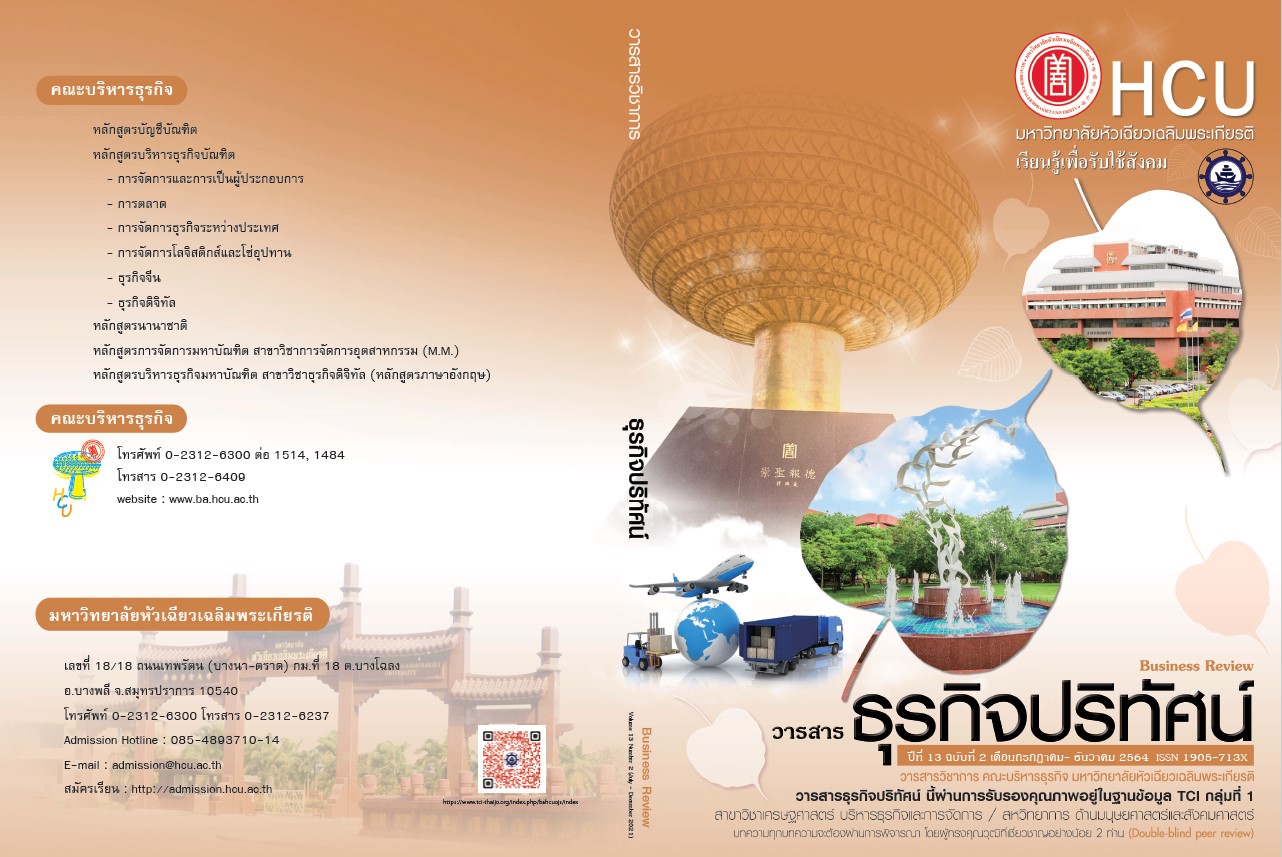The Influence of Organizational Climate and Organizational Commitment on Employee’s Performance in an Automotive Parts Manufacturer in Amata City Industrial Estate, Chonburi
Keywords:
Employees Performance, Organizational Climate, Organizational CommitmentAbstract
The objectives of this study were: 1) to assess the level of organizational climate, organizational commitment, and employees’ performance; 2) to determine the effect of organizational climate on employees’ performance; 3) to determine the effect of organizational climate on organizational commitment; and 4) to determine the effect of organizational commitment on employees’ performance. The sample size was 400 employees working in an automotive parts manufacturing company in Amata City industrial estate, Chonburi province. The questionnaire was used as a tool for collecting data. The data was analyzed using mean, standard deviation, and structural equation modeling (SEM). The results of this study revealed that the level of organizational climate, organizational commitment, and employees’ performance were all at a high level. The results of structural equation modeling analysis indicated that organizational climate had no direct effect on the employees’ performance with statistical significance at the 0.05 level. The organizational climate had a significant effect on the organizational commitment of the employees, and the organizational commitment had a significant effect on the employees’ performance. Therefore, the organizational climate affected the employees’ performance through organizational commitment. The organizational climate and organizational commitment could explain 63.0% of the variance in the employees’ performance.
References
ดวิษา สังคหะ. (2559). ความสัมพันธ์ระหว่างบรรยากาศองค์กรกับความเป็นองค์กรแห่งการเรียนรู้ของสำนักงานศึกษาธิการภาค 1-13. วิทยานิพนธ์บริหารธุรกิจมหาบัณฑิต, มหาวิทยาลัยสงขลานครินทร์.
ธนัญวรินทร์ ศิริชุม. (2560) .ปัจจัยที่ส่งผลต่อผลการปฏิบัติงานของพนักงานเทศบาลนครสงขลา. วิทยานิพนธ์บริหารธุรกิจมหาบัณฑิต, มหาวิทยาลัยหาดใหญ่.
ธานินทร์ ศิลป์จารุ. (2555). การวิจัยและวิเคราะห์ข้อมูลทางสถิติด้วย SPSS. พิมพ์ครั้งที่ 13. กรุงเทพ: บิสซิเนสอาร์แอนด์ดี.
ปาริชาต บัวเป็ง. (2554). ปัจจัยที่มีผลต่อความผูกพันต่อองค์กรของพนักงาน บริษัท ไดกิ้น อินดัสทรีส์ ประเทศไทย (จำกัด). การค้นคว้าอิสระบริหารธุรกิจมหาบัณฑิต, มหาวิทยาลัยเทคโนโลยีราชมงคลธัญบุรี.
มะลิวรรณ อรรคเศรษฐัง และ สายตา บุญโฉม. (2559). บรรยากาศองค์กรที่ส่งผลต่อประสิทธิภาพในการปฏิบัติงานของบุคลากร สำนักงานสรรพากรพื้นที่กาฬสินธุ์. การประชุมวิชาการและเสนอผลงานวิจัยระดับชาติ ครั้งที่ 3 ก้าวสู่ทศวรรษที่ 2: บูรณาการงานวิจัย ใช้องค์ความรู้ สู่ความยั่งยืน, 17 มิถุนายน 2559 วิทยาลัยนครราชสีมา. อำเภอเมือง จังหวัดนครราชสีมา: สยามมัลติซอฟ.
สุดารัตน์ พิมลรัตนกานต์. (2560). อิทธิพลของการรับรู้บรรยากาศองค์กรผ่านความพึงพอใจในงานและความผูกพันต่อองค์กรที่มีผลการปฏิบัติงานตามบทบาทหน้าที่. Veridian E-Journal, Silpakorn University, 10(2), 1611-1629.
อัจฉรา เฉลยสุข. (2556). อิทธิพลของบรรยากาศองค์กรที่มีผลต่อความผูกพันต่อองค์กร คุณภาพการให้บริการและความพึงพอใจของลูกค้าต่อพนักงาน. วิทยานิพนธ์บริหารธุรกิจมหาบัณฑิต, มหาวิทยาลัยเทคโนโลยีราชมงคลธัญบุรี.
อาริญา เฮงทวีทรัพย์สิริ. (2558). ความผูกพันต่อองค์กร บุคลิกภาพห้าองค์ประกอบและความสุขใน การทำงานของพยาบาล โดยมีพฤติกรรมการเป็นสมาชิกที่ดีขององค์กรเป็นตัวแปรสื่อ. วิทยานิพนธ์ศิลปศาสตรมหาบัณฑิต, มหาวิทยาลัยธรรมศาสตร์.
Adenike, A., (2011). Organizational climate as a predictor of employee job satisfaction: Evidence from Covenant University. Business Intelligence Journal, 4(1), 151-165.
Andrew, O. C., & Sofian, S. (2012). Individual factors and work outcomes of employee engagement. Procedia-Social and Behavioral Sciences, 40, 498-508.
Branson, C. M. (2008). Achieving organizational change through value alignment. Journal of Educational Administration, 46(3), 376-395.
Dalal, R. S., Baysinger, M., Brummel, B. J., & LeBreton, J. M. (2012). The relative importance of employee engagement, other job attitudes and trait affect as predictors of job performance. Journal of Applied Social Psychology, 42(S1), 295-325.
Franco, M., & Franco, S. (2017). Organizational commitment in family SMEs and its influence on contextual performance. Team Performance Management: An International Journal, 23(7), 364-384.
Goodman, S. A., & Svyantek, D. J. (1999). Person-organization fit and contextual performance: Do share values matter. Journal of Vocational Behavior, 55(2), 254–275.
Gray, R. (2007). A climate of success: Creating the right organization climate for high performance. Amsterdam: Elsevier/Butterworth-Heinemann.
Hair, J. F., Black, W. C., Bain, B. J., Anderson, R. E., & Tatham, R. L. (2006). Multivariate data analysis (6th ed.). Upper Saddle River. NJ: Pearson Education International.
Li, P. Y., & Mahadevan, A. (2017). A study on the impact of organizational climate on employee performance in a Malaysian consultancy. International Journal of Accounting & Business Management, 5(1), 1-13.
Litwin, G. H., & Stringer, R. A. (1968). Motivation and organizational climate. Boston: Harvard University Press.
Marsh, H. W., & Hocevar, D. (1985). Application of confirmatory factor analysis to the study of self-concept: First- and higher order factor models and their invariance across groups. Psychological Bulletin, 97(3), 562-582.
Meyer, J. P., & Allen, N. J. (1991). A three-component conceptualization of organizational commitment. Human Resource Management Review, 1(1), 61-89.
Nazir, O., & Islam, J. U. (2017). Enhancing organizational commitment and employee performance through employee engagement: An empirical check. South Asian Journal of Business Studies, 6(1), 98-114.
Otieno, B. B. A., Waiganjo, E. W., & Njeru, A. (2015). Effect of employee engagement on organization performance in Kenya’s horticultural sector. International Journal of Business Administration, 6(2), 77-85.
Pradhan, R. K., & Jena, L. K. (2017). Employee performance at workplace: Conceptual model and empirical validation. Business Perspectives and Research, 5(1), 1-17.
Sarbessa, B. (2014). Organizational climate and employees’ organizational commitment: A case study of commercial bank of Ethiopia. M.B.A. Thesis, Addis Ababa University, Ethiopia.
Seyyedmoharrami, I., Dehaghi, B.F., Abbaspour, S., Zandi, A., Tatari, M., Teimori, G., & Torbati, A.G. (2019). The relationship between organizational climate, organizational commitment and job burnout: Case study among employees of the University of Medical Sciences. Open Public Health Journal, 12(1), 94-100.
Downloads
Published
How to Cite
Issue
Section
License
All articles published in the Business Administration and Management Journal Review are copyrighted by the journal.
The views and opinions expressed in each article are solely those of the individual authors and do not represent those of Huachiew Chalermprakiet University or any other faculty members. Each author is fully responsible for the content of their own article. Any errors or issues found are the sole responsibility of the respective author.




